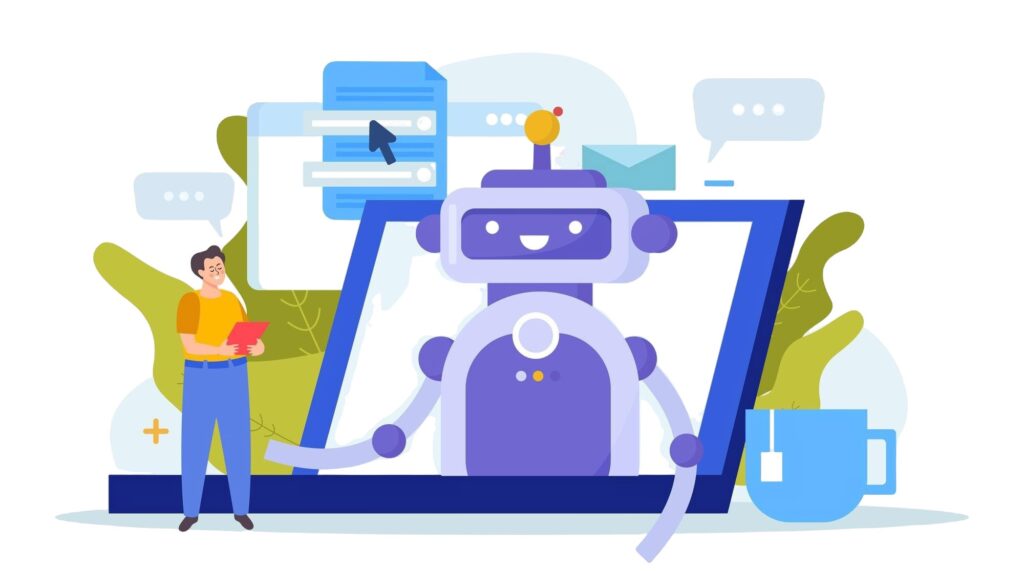Artificial Intelligence (AI) is transforming the landscape of industries, creating innovative solutions that drive efficiency, scalability, and improved decision-making. One of the most compelling advancements is the introduction of AI agents—intelligent systems designed to automate tasks, engage with users, and deliver results across a variety of domains.
But what exactly are AI agents, and how are they shaping the future?
In this comprehensive guide, we’ll dive deep into the world of artificial intelligence (AI) agents, exploring their definition, functionality, benefits, applications, and much more. Whether you’re a business leader looking to optimize operations or a technology enthusiast eager to understand AI, this article will provide a complete and well-rounded view of what AI agents are and why they matter.
What Are AI Agents?
AI agents represent a class of software programs powered by artificial intelligence designed to autonomously perform tasks, make decisions, and interact with users or systems. Unlike static software tools, AI agents are dynamic and continuously evolve by learning from interactions and adapting to changes in their environment. They are driven by machine learning algorithms, natural language processing (NLP), and advanced decision-making frameworks.
Facts & Statics about AI Agents
- AI agents market are projected to save businesses over $47.1 billion annually by 2030 through enhanced customer service, automation, and process optimization.
- 85% of customer interactions will be handled without human agents by 2025, thanks to AI-driven chatbots and virtual assistants.
- AI agents can process data and respond to inquiries up to 100x faster than humans, making them invaluable in industries like healthcare, finance, and customer support.
- A recent study found that 80% of consumers prefer interacting with AI-driven systems for basic customer service tasks like checking order status or resetting passwords.
- AI agents in e-commerce have been shown to increase conversion rates by up to 30% through personalized recommendations and streamlined shopping experiences.
Core Characteristics of AI Agents
AI agents distinguish themselves from traditional automation tools by offering capabilities that go far beyond simple task execution. These characteristics enable AI agents to perform complex, dynamic tasks that make them essential for businesses looking to improve productivity, enhance customer experiences, and streamline operations.
Below are the core characteristics that define AI agents:
- Autonomy: One of the key features of AI agent is their ability to perform tasks and make decisions independently. Unlike traditional automation tools, which require pre-set instructions or human intervention for every action, AI agents can operate autonomously. They analyze data, make decisions based on predefined parameters or learned behavior, and complete tasks without the need for constant supervision. This level of autonomy allows businesses to automate complex workflows and processes, freeing up human resources for more strategic tasks.
- Adaptability: Artificial intelligence agents are designed to adapt and evolve over time, thanks to machine learning algorithms. This adaptability enables them to better handle new and unforeseen scenarios, making them more effective in dynamic environments. For instance, if an AI agent encounters a new problem or receives new input, it can adjust its behavior based on its experiences, improving its responses over time. This makes AI agents especially valuable in situations where conditions change frequently, such as customer service or operations management.
- Natural Interaction: One of the most important features of AI agents is their ability to interact with humans in a natural and intuitive way. Using Natural Language Processing (NLP) and other advanced communication technologies, AI agents can understand and respond to human language in a conversational manner. Whether through text or voice, these agents can interpret user queries, requests, or commands, and respond in a way that feels more human-like than traditional, rigid systems. This makes interactions smoother and more effective, fostering a better user experience.
- Proactivity: AI agent are not simply reactive; they can anticipate user needs and offer solutions even before they are explicitly requested. By analyzing past behavior, contextual data, and patterns, these agents can predict what actions or information a user might need next. For instance, an AI agent could suggest a follow-up step in a process or provide recommendations based on previous interactions. This proactive behavior not only saves time but also enhances user satisfaction by providing personalized and timely support.
- Versatility: AI agents are versatile tools that can operate across multiple platforms and channels, making them adaptable to various business needs. Whether it’s a chatbot assisting customers on a website, a voice assistant in a mobile app, or an AI-driven assistant within an enterprise software suite, AI agents can function across different mediums. This versatility allows businesses to implement AI agent in various departments or across a range of use cases, such as customer service, sales, marketing, and operations, creating a seamless experience for both users and businesses.
How Are AI Agents Different From Traditional Automation?
While traditional automation relies on predefined scripts or rule-based systems, AI agents go beyond static capabilities. For example, a rule-based chatbot can only respond to specific triggers, whereas an AI agent can understand nuanced queries, remember past interactions, and make context-driven decisions.
Consider this analogy: A basic calculator performs calculations when instructed, but a financial AI agent analyzes your spending patterns, offers savings tips, and proactively alerts you to risky transactions—all without your prompting.
Examples of AI Agents in Action
- Customer Support: AI-powered chatbots that handle queries and resolve complaints.
- Healthcare Assistants: Virtual agents that schedule appointments and provide basic health advice.
- Sales Automation: AI agents engage leads, qualify prospects, and streamline follow-ups.
By merging intelligence with automation, AI agents deliver results that are both scalable and customizable to unique business needs.
How Do AI Agents Work?
Understanding how AI agents function requires dissecting the layers of technology that empower them. These agents rely on a combination of input mechanisms, processing algorithms, and action frameworks to operate seamlessly. Below is a step-by-step explanation of their working process.
1. Input Perception
AI agent begin by gathering data from their environment. This could include user inputs (text or speech), system data (like APIs), or environmental cues (like IoT sensors). For instance, a voice-activated assistant like Alexa perceives spoken words, converts them into text using speech-to-text algorithms, and processes the request.
2. Data Processing and Understanding
Once input is gathered, AI agents employ machine learning(ML) and NLP algorithms to understand the context and intent behind the data. This stage involves:
- Text Analysis: Breaking down user input into comprehensible components.
- Sentiment Analysis: Gauging user emotions to tailor responses appropriately.
- Pattern Recognition: Identifying trends or similarities from past data to predict outcomes.
3. Decision-Making Frameworks
AI agents use decision-making models like neural networks, Bayesian inference, or fuzzy logic to determine the optimal action. For instance, an AI financial advisor evaluates risks, compares investment options, and suggests the best portfolio strategy based on real-time market data.
4. Action Execution
The final stage involves executing the task or delivering the desired response. This could mean updating a database, providing a verbal response, or triggering a system workflow. For example, an AI agent in logistics might reroute a delivery vehicle based on real-time traffic conditions.
Key Features of AI Agents
AI agents possess a range of advanced features that set them apart from traditional automation tools. These features make them highly adaptable and versatile for various applications, allowing businesses to achieve goals that were once thought impossible. Below is a detailed exploration of the key features that define AI agents:
1. Natural Language Processing (NLP)
Artificial intelligence agents leverage NLP to understand and respond to human language effectively. This feature enables seamless interactions that mimic human conversations, making the user experience intuitive and engaging.
Capabilities of NLP in AI Agents:
- Text and Speech Recognition: Understands written and spoken inputs.
- Sentiment Analysis: Identifies the user’s emotional tone to tailor responses appropriately.
- Context Awareness: Retains context across multiple exchanges for a coherent dialogue.
Example:
A customer service AI agent can recognize frustration in a user’s tone and prioritize escalation to a human agent while maintaining a polite and empathetic response.
2. Adaptive Learning
AI agents continuously learn and evolve by analyzing historical data and feedback. This adaptability allows them to improve their decision-making and become more efficient over time.
How It Works:
- Uses machine learning models to identify patterns and trends.
- Updates algorithms based on new data and user interactions.
- Learns from errors to enhance accuracy in future tasks.
Example:
An AI-powered virtual sales assistant refines its product recommendations based on a customer’s purchase history and browsing habits.
3. Integration with Ecosystems
AI agents are designed to integrate seamlessly with existing software and systems, such as CRMs, ERPs, and data management tools. This feature ensures they can enhance workflows without disrupting operations.
Key Integration Points:
- Synchronization with databases for real-time updates.
- Plug-and-play compatibility with third-party tools.
- API support for custom integrations.
Example:
An AI agent in a retail business updates inventory levels in a centralized system after processing an order, ensuring accurate stock records across all sales channels.
4. Decision-Making and Proactive Assistance
AI agents use advanced algorithms, including neural networks and decision trees, to evaluate multiple options and take the best course of action autonomously.
Proactive Features:
- Predicts user needs and offers solutions before being asked.
- Alerts users to potential issues, such as missed deadlines or anomalies in data.
Example:
A project management AI agent reminds a team of an upcoming deadline and suggests reallocating resources to ensure timely completion.
5. Multimodal Interaction Capabilities
Modern Artificial intelligence agents support multiple interaction modes, including text, voice, and visual interfaces, making them versatile for diverse user preferences.
Applications:
- Chatbots for text-based interactions.
- Voice assistants for hands-free operation.
- Virtual avatars for a more engaging user experience.
Example:
A smart home AI agent responds to voice commands to control lighting and displays visual updates on a connected screen.
6. Scalability and Reliability
AI agents are built to handle large volumes of tasks or interactions simultaneously, ensuring consistent performance even during peak demand periods.
Key Aspects:
- Cloud-based scalability for growing businesses.
- Fault-tolerant systems to maintain operations during unexpected failures.
Example:
During a product launch, an e-commerce website’s AI chatbot handles thousands of customer inquiries simultaneously without downtime.
7. Security and Compliance
AI agents incorporate robust security measures to protect user data and comply with regulatory standards.
Key Features:
- End-to-end encryption for secure communication.
- Role-based access controls to limit unauthorized usage.
- Built-in compliance checks for GDPR, HIPAA, and other regulations.
Example:
A financial AI agent ensures sensitive customer data is encrypted while complying with financial industry standards.
Types of Artificial intelligence (AI) Agents
AI agents come in various forms, each tailored to specific use cases and industries. Understanding these types helps businesses and enthusiasts choose the right solution for their needs. Let’s explore the key categories of AI agents and their unique characteristics.
1. Reactive Agents
Reactive agents are the simplest form of AI agents. They act solely based on current inputs without any memory of past interactions. While their functionality may seem basic, reactive agents are incredibly efficient for tasks requiring immediate responses.
Key Features:
- Operate based on predefined rules.
- Ideal for straightforward and repetitive tasks.
- Do not learn or adapt over time.
Use Cases:
- Voice-activated commands for smart home devices.
- Simple customer support systems for FAQs.
Example:
Consider a chatbot that provides weather updates. It fetches real-time data based on the user’s query but doesn’t retain information about previous interactions.
2. Cognitive Agents
Cognitive agents are a significant step up in complexity. These agents can store past interactions, analyze them, and use the information to improve future performance. Their ability to adapt and evolve makes them invaluable for dynamic and personalized applications.
Key Features:
- Incorporate machine learning algorithms to learn from data.
- Understand context and user preferences.
- Continuously improve based on feedback.
Use Cases:
- Virtual shopping assistants offering personalized recommendations.
- Customer service agents handling complex and evolving queries.
Example:
An AI-powered personal finance assistant that tracks your spending habits and suggests budgeting strategies over time.
3. Collaborative Agents
Collaborative agents are designed to work alongside humans, augmenting their abilities rather than replacing them. They act as partners, providing insights, handling repetitive tasks, and enabling users to focus on strategic goals.
Key Features:
- Share responsibilities with human counterparts.
- Support decision-making through advanced analytics.
- Foster a symbiotic relationship between humans and machines.
Use Cases:
- Project management tools that track progress and recommend optimizations.
- AI assistants helping doctors analyze patient data for diagnostics.
Example:
A marketing AI agent that drafts email campaigns while the marketer approves and refines the content.
4. Autonomous Agents
Autonomous agents represent the pinnacle of AI capability. These agents operate entirely independently, making decisions and executing tasks without human oversight. They are equipped to handle complex, multi-faceted challenges in real-time.
Key Features:
- Fully self-sufficient in decision-making and action execution.
- Capable of adapting to unforeseen situations.
- Often employ advanced neural networks and reinforcement learning.
Use Cases:
- Self-driving cars navigating traffic and adhering to road rules.
- AI-powered investment bots making real-time trades based on market analysis.
Example:
Tesla’s autopilot system, which adjusts to road conditions, recognizes obstacles, and optimizes routes autonomously.
Key Benefits of AI Agents
The adoption of artificial intelligence (AI) agent is driven by their transformative benefits. These intelligent systems provide measurable advantages across industries, empowering businesses to achieve higher efficiency, cost savings, and enhanced user experiences. Below is a comprehensive look at their key benefits:
1. Enhanced Productivity and Efficiency
AI agents automate time-consuming tasks, allowing human employees to focus on more strategic responsibilities. By taking over repetitive work, they streamline operations and minimize errors.
How It Helps:
- Automates ticket resolution in IT support.
- Manages routine administrative tasks like scheduling and data entry.
- Speeds up workflows by handling mundane yet critical functions.
Example:
An HR AI agent processes hundreds of leave requests daily, significantly reducing manual effort while maintaining accuracy.
2. Cost Reduction
By replacing or augmenting manual processes, AI agents lower operational costs. They eliminate the need for extensive human intervention, saving resources while delivering high-quality results.
Cost-Saving Aspects:
- Reduces hiring costs by automating customer support or IT helpdesk roles.
- Minimizes errors that could lead to financial losses.
- Scales operations without proportional increases in expenditure.
Example:
A call center AI agent reduces staffing requirements by managing 70% of inbound inquiries without human involvement.
3. 24/7 Availability
AI agent work around the clock, ensuring uninterrupted service and support. Their ability to handle tasks without breaks makes them invaluable for businesses with global or high-demand operations.
How It Helps:
- Provides real-time responses to customer inquiries regardless of time zones.
- Ensures operational continuity during holidays or peak seasons.
Example:
An e-commerce chatbot answers customer questions about order tracking at any hour, improving user satisfaction.
4. Personalization and Customer Satisfaction
AI agents analyze individual preferences and behaviors to deliver highly tailored interactions. This level of personalization fosters stronger customer relationships and loyalty.
Personalization in Action:
- Recommends products or services based on user history.
- Tailors marketing messages to individual customer needs.
Example:
A streaming service AI agent curates personalized movie suggestions, increasing user engagement.
5. Scalability Without Compromising Quality
AI agents handle growing workloads with ease, enabling businesses to expand without sacrificing service quality. This makes them ideal for scaling operations during periods of rapid growth or high demand.
Scalable Applications:
- Managing customer support queries during holiday shopping seasons.
- Processing large volumes of financial transactions securely.
Example:
A logistics company uses Artificial intelligence agents to coordinate deliveries for thousands of orders daily, ensuring accuracy and efficiency.
6. Data-Driven Insights
AI agents collect and analyze data from every interaction, offering businesses actionable insights. These insights enable organizations to optimize processes, predict trends, and make informed decisions.
Key Benefits:
- Provides analytics on user behavior and preferences.
- Identifies inefficiencies or bottlenecks in workflows.
Example:
An AI agent in retail analyzes shopping trends to recommend product placement strategies for maximum sales.
7. Consistency Across Channels
AI agent deliver uniform experiences across multiple platforms, ensuring users receive the same quality of service whether they interact via email, social media, or voice calls.
How It Helps:
- Maintains a consistent tone and style in communications.
- Reduces variability in service quality caused by human error.
Example:
A telecom company deploys AI agents on its website, mobile app, and call center, providing cohesive support across all channels.
Top 5 AI Agents Software
With the proliferation of AI agents, numerous software solutions have emerged to cater to various business needs. These platforms combine advanced AI capabilities with user-friendly interfaces, enabling businesses to leverage the power of intelligent automation effectively. Here are the top five AI agent software tools making waves in the industry:
1. IBM Watson Assistant
IBM Watson Assistant is a robust and scalable AI-powered virtual assistant designed to handle customer inquiries and automate workflows. Known for its natural language understanding (NLU) capabilities, it can interact with users across multiple channels, including websites, apps, and messaging platforms.
Key Features:
- Advanced NLU and NLP for human-like conversations.
- Integration with popular business tools like Salesforce and Slack.
- Customizable workflows to suit specific use cases.
- Real-time analytics and insights to optimize interactions.
Best Suited For:
Businesses looking for a highly customizable AI agent solution for customer service, IT support, or sales assistance.
2. Google Dialogflow
Google Dialogflow is a popular conversational AI platform that enables developers to build chatbots and virtual agents effortlessly. Backed by Google’s machine learning expertise, Dialogflow supports voice and text-based interactions with seamless integration across Google’s ecosystem.
Key Features:
- Support for over 20 languages.
- Prebuilt agents for common use cases, reducing setup time.
- Integration with Google Cloud for scalability and reliability.
- Voice support for smart devices and telephony systems.
Best Suited For:
Developers and businesses seeking a versatile platform for creating intelligent chatbots and voice assistants.
3. Microsoft Azure Bot Service
Microsoft Azure Bot Service allows businesses to develop, deploy, and manage AI-powered bots across various platforms. Leveraging Azure’s cloud infrastructure, this service provides a secure and scalable environment for building intelligent agents.
Key Features:
- Integration with Azure Cognitive Services for enhanced functionality.
- Built-in templates for common use cases like customer support and scheduling.
- Multi-channel support, including Skype, Teams, and Facebook Messenger.
- Real-time monitoring and debugging tools for developers.
Best Suited For:
Enterprises that use Microsoft’s ecosystem and need a reliable platform for deploying scalable AI agents.
4. Amazon Lex
Amazon Lex, part of AWS, powers conversational interfaces for applications using voice and text. With the same technology that drives Alexa, Lex is ideal for creating sophisticated, AI-driven bots.
Key Features:
- Seamless integration with AWS services like Lambda and DynamoDB.
- Support for voice-based interfaces.
- Built-in deep learning models for speech recognition and text interpretation.
- Scalability for handling large volumes of interactions.
Best Suited For:
Organizations already using AWS infrastructure and looking to incorporate AI agents into their workflows.
5. Zoho Desk AI
Zoho Desk AI offers AI-driven automation specifically tailored for customer support. Its Zia AI assistant acts as a proactive agent, helping users resolve queries, predict issues, and enhance customer experiences.
Key Features:
- Context-aware responses for personalized interactions.
- Integration with Zoho’s suite of business tools.
- AI-powered sentiment analysis to gauge customer emotions.
- Multi-channel deployment across email, social media, and chat platforms.
Best Suited For:
Small to mid-sized businesses seeking an affordable and efficient AI agent for customer service.
Challenges and Solutions in AI Agents
Despite their immense potential, AI agent come with challenges that need to be addressed to unlock their full capabilities. Understanding these challenges and implementing effective solutions is essential for businesses and developers alike.
1. Lack of Empathy
AI agents, while intelligent, often lack the emotional nuance required for highly sensitive interactions. For example, a customer lodging a complaint about a personal issue may feel unsatisfied with an automated response.
Solution:
Implement a human-in-the-loop system where AI agents handle routine tasks and escalate emotionally charged interactions to human representatives. Additionally, advancements in sentiment analysis can enable AI agents to respond more empathetically.
2. Data Privacy Concerns
AI agent process vast amounts of user data, raising concerns about security and compliance. Mishandling sensitive information could lead to legal consequences and loss of trust.
Solution:
Adopt robust encryption techniques and comply with data protection laws like GDPR and CCPA. Regularly audit AI systems to ensure compliance and security.
3. Miscommunication and Errors
AI agents may misinterpret complex queries or fail to provide relevant responses, leading to user frustration.
Solution:
Invest in continuous training of AI models using diverse datasets. Regular updates and fine-tuning ensure the agents remain accurate and reliable.
4. High Implementation Costs
Developing and deploying AI agents can be costly, especially for small businesses.
Solution:
Explore cost-effective options like SaaS-based AI agent platforms that offer pay-as-you-go models. These platforms reduce upfront costs and allow businesses to scale usage as needed.
5. Resistance to Adoption
Employees and customers may resist interacting with Artificial intelligence agents, fearing job losses or preferring human touchpoints.
Solution:
Educate stakeholders on the benefits of AI agents and their role as complementary tools rather than replacements. Demonstrating tangible improvements in efficiency and service quality can foster acceptance.
AI agents are not without hurdles, but these challenges are surmountable with strategic planning, proper training, and ethical implementation.
How to Choose the Right AI Agent Software
When selecting AI agent software for your business, it’s important to carefully evaluate a variety of factors to ensure that the solution you choose aligns with your goals and operational needs. The right AI agent can significantly enhance productivity, streamline workflows, and improve customer satisfaction, but choosing the wrong one can lead to inefficiencies and wasted resources. To make an informed decision, consider the following key factors:
1. Integration Requirements
One of the most important aspects to consider when choosing AI agent software is how well it integrates with your existing systems and workflows. Whether you’re using CRM tools, marketing platforms, or enterprise resource planning (ERP) software, it’s essential that your AI agent can seamlessly connect with these tools. Look for platforms that offer easy integration with third-party applications and APIs, ensuring that the AI solution can work cohesively within your current technological ecosystem. Software that doesn’t integrate well may result in siloed data and hinder productivity, negating the benefits of automation.
2. Scalability
As your business grows, your software needs will evolve. It’s crucial to select an AI agent solution that can scale with your business. Assess whether the platform has the capability to handle increasing workloads, larger volumes of data, and expanding user bases. A scalable solution will ensure that your business can continue to benefit from the AI agent as your needs grow, avoiding the need for a major upgrade or switch in the future. Scalability should be a key factor in your decision, especially if you plan to expand your operations or introduce new business models.
3. Ease of Use
User-friendliness is another critical factor when evaluating AI agent software. A complex and difficult-to-use platform may lead to confusion, extended training periods, and a steep learning curve for your team. Look for AI solutions that offer intuitive interfaces, clear documentation, and straightforward setup processes. A user-friendly tool will allow your team to get up and running quickly, ensuring faster adoption and more efficient use of the platform. Remember, the goal is to automate processes and enhance productivity, not to create additional complexities.
4. Customization
Every business is unique, and the AI agent you choose should be customizable to meet your specific needs. Evaluate whether the software allows for the customization of workflows, AI behaviors, and processes. A flexible platform will enable you to tailor the AI agent to fit your business’s requirements, ensuring that it serves your specific objectives. Customization options may include adjusting algorithms, training the AI with proprietary data, or modifying interfaces to reflect your company’s branding and communication style. A solution that can be tailored to your exact needs can help optimize its performance and improve its impact on your business.
These factors—integration requirements, scalability, ease of use, and customization—are essential considerations when selecting the right AI agent software for your business. By carefully evaluating these aspects, you can choose a platform that not only fits seamlessly into your existing systems but also grows with your business over time.
With the right AI tools in place, you can automate processes, improve operational efficiency, and enhance customer experiences, ultimately driving your business forward. The right AI agent software is a powerful tool that can transform your business operations and position you for success in the digital age.
Future Trends in AI Agents
The future of AI agents is set to bring significant changes to industries worldwide, thanks to rapid advancements in technology. These improvements will expand their capabilities, making Artificial intelligence agents even more integral to business processes. Here are some key trends to watch:
1. Voice-Based Interactions
Voice-enabled AI agents are becoming increasingly sophisticated, and their presence is set to dominate industries ranging from customer service to healthcare. The ability to interact with AI agents using natural language voice commands offers a more intuitive and convenient experience for users. As speech recognition technology improves, these voice-based agents will be able to understand accents, languages, and even complex conversational cues, making user interactions smoother and more efficient. For businesses, this will lead to more personalized customer service and enhanced user experiences.
2. Emotional Intelligence
One of the most exciting developments in AI agent is the push towards emotional intelligence. AI agents of the future will be able to recognize and respond to human emotions, tone, and mood by analyzing voice inflections, text patterns, and even facial expressions. By understanding the emotional state of the user, AI agents will provide more empathetic, personalized, and context-aware interactions. This emotional awareness could revolutionize customer service, healthcare, and mental health support, allowing AI agents to offer not only technical solutions but also emotional support when needed.
3. Industry-Specific Agents
As AI technology continues to mature, we can expect to see the rise of industry-specific Artificial intelligence agents tailored to meet the unique needs of niche sectors. For example, in the legal field, AI agents could assist with case research, document review, and even drafting legal documents. In real estate, AI agent might provide property recommendations, facilitate virtual tours, and automate client communication. In manufacturing, AI agents could optimize production lines, monitor machinery health, and assist with inventory management. These specialized agents will provide deeper insights, increase efficiency, and reduce costs for businesses in various industries.
4. Integration with IoT
The future of AI agents is deeply intertwined with the Internet of Things (IoT). As more devices become connected, AI agents will increasingly be able to work seamlessly with IoT ecosystems to manage and automate tasks. For example, an AI agent could interact with smart home devices to adjust lighting, temperature, and security settings based on user preferences or patterns. In industries like logistics or manufacturing, AI agent can monitor IoT devices in real-time, flagging issues before they become problems. The integration of AI agents with IoT will create more intelligent, connected systems that operate smoothly and autonomously.
Conclusion
AI agents are revolutionizing the way we work, interact, and solve problems. Their ability to automate tasks, engage users, and make intelligent decisions positions them as invaluable tools across industries. As technology evolves, Artificial intelligence agents will continue to reshape the future, offering endless possibilities for innovation and efficiency. Whether you’re a business leader or a tech enthusiast, now is the time to explore the transformative power of AI agents.
FAQs about AI Agent
Chatbots are limited to predefined responses, while AI agents are more advanced and capable of learning and decision-making.
Absolutely! AI agents are scalable solutions that can streamline operations, reduce costs, and improve customer engagement.
Yes, if implemented with robust security measures like encryption and access controls.
Industries like healthcare, finance, retail, and education leverage Artificial intelligence agents extensively.
Understanding complex queries, emotional intelligence, and ethical decision-making are areas for improvement.






2 thoughts on “What Are AI Agents? A Complete Guide for Businesses”
Thank you for sharing your info. I really appreciate your efforts, and I am waiting for your next write-ups. How do you think the rise of AI agents impacts the SaaS market in any way? Just asking! Thank you once again.
Hi there, mates. How is everything, and what do you desire to say regarding artificial intelligence agents? In my view, it’s actually awesome for me.